Let’s make some time to read
In this blogpost, I will explain how I managed to evolve from one or two books to at least 15 books a year.
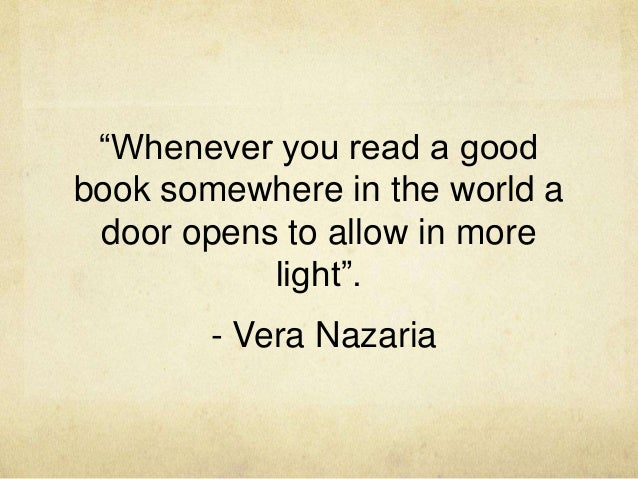
Make it a ritual
In today’s ultra-connected and busy life, we tend to continuously prioritize urgent tasks over important tasks. Replying to your friend’s messages on Whatsapp is maybe urgent, but often not so important. However, an important but not urgent “task”, is reading and learning. Because of the lack of urgency, we tend to forget to read.
In order to help that, I have instilled a new ritual in my life. Every evening, or at least the evenings when I’m home, before going to bed, I mute my phone and replace TV-time by reading time.
The reason why it is important to make it a ritual is that it takes in average 2 months before a new behaviour turns into a new habit (https://jamesclear.com/new-habit), and like you know, habits are powerful because we don’t need to think about them anymore, we repeat them automatically.
Commute
Whenever I’m using the public transport, I read. But because a book can sometimes be very thick, or have a clumsy format, I bought an e-reader, and that was my best buy of 2017. I just love it! Small, light and a perfect ‘paper’ lookalike.
Because reading is impossible when driving a car, I just listen to audio-books or podcasts instead. While audiobooks are nice, I do have a slight preference for podcasts as I find them more easy to digest than books. One of my favorite podcasts on Spotify is on leadership and is called “EntreLeadership” (https://www.entreleadership.com/). Great insights. I’m a strong atheist and this podcast is religious, however, the values that are shared through the interview are universal, so I don’t mind the religious background.
Blinkist: a fast way to learn
One of the greatest apps I recently found is Blinkist. The app “summaries” in a very good, useful and efficient way the most important points of tons of non-fictional books. In fifteen to twenty minutes, you can catch up with the most important aspects of a specific book. It is then up to you to evaluate if you have enough information, or if the book is worth diving into.
Here is a good and transparent review on Blinkist: https://willyoulaugh.com/blinkist-review/
My take home message is try make reading a habit. If reading is too demanding for you or if you just prefer to listen instead, audio-books and podcasts are a great way to go. Apps like Blinkist make it so easy today as they just provide you with an easily searchable library of audio-summaries to help you get a lot of value out of books in a record of time. If George W. Bush was able to free enough time to read 186 books in two years while serving as president of the United States, we can manage to read more than that one book a year, right?
The power of communicating openly and transparently
Last week, I realised how glad and lucky I am to have a team that communicates openly and transparently on a daily basis, as it proved to me how effective it can be.
Core values
A lot of companies have core values printed on paper somewhere in an office. Very few of them, however, are actually creating a company culture built around these core values. Writing them is one step, but applying them is the most difficult step and is therefore often neglected.
When we jumped on this Transformactive adventure almost a year ago, one of the first thing we worked on were the core values of Transformactive which are built around trust. Our first aim was to make sure we respected and followed these values daily. It took several months to define them all, and it took additional months to apply them, and one of the first which we defined was the ‘open and transparent communication’ core value.
When open communication helps to uncover a fear
Last week, we had some important meetings about matters that will have an impact on our long-term vision and we weren’t all aligned. That’s ok, that’s even good, because it leads to debate that enriches the discussion. However, debating was not working. Arguments were used that weren’t making sense, which doesn’t happen often in our team.
That’s when I decided that we had to dig further, and to change the discussion from the meeting’s topic to something broader: We shared our current (global or specific) impressions, feelings and eventual fears. I realised that there was indeed a fear, and some global misunderstanding that led – without any causal relation – to the misalignment on the meeting’s topic. Talking openly and transparently about these aspects helped us in managing the fear, and removing the misunderstandings.
If the team had not clearly communicated their feelings, the misunderstandings would have stayed and a sense of “unfairness” would have grown in the persons’ mind. If not handled well, it could have led to frustrations and therefore to a loss of motivation, efficiency and trust.
Communicate to understand someone else’s point of view
Everyone has his or her own glasses that he or she is using to look at and interpret the reality. However, without sharing the specifics of the glasses you are using, the reality can be interpreted completely differently by someone else. It is thus very important to dare to be open and transparent, even if we think that it could hurt someone, because at the end, if you do it constructively, the person will only respect you more.
My message for the week is to work on communication. That’s a very important aspect in every relation, professional or personal. Sometimes, communicating openly and transparently seems not the right thing to do, or just too difficult to do, but at the end, it’s for everyone’s best interest. The more difficult it is for you to communicate, the more the other person will appreciate your effort. That’s the power of communication.
Let them do the scoring
In his great book “Good to Great”, Jim Collins uses a metaphor that says leaders should get the right people in the right seats on the bus. Personally, I prefer the metaphor of a team sport instead of a bus, because in a bus, the seat that you choose doesn’t really matter (except if you’re the driver). I’m playing basketball since that I’m 12, so let me use that as an example.
The point guard (PG) leads the game
In basketball, the PG’s job is to run the team’s offence by making sure that the players are in their right position. He/she should distribute the ball to his/her teammates at the right time so that THEY can score. Sometimes, the PG scores too, but it’s mainly the teammates that should score while he/she is giving the assists.
That’s exactly your job as a leader. You must find the right teammates, put them in the positions where they excel and give them enough opportunities to score. Let them do the scoring. It’s not about you, it’s about your team.
The players trust each other completely

The opponent is winning 79-78, you have the ball and you look at the timer: 5 seconds left! You dribble, the defence is tight, but you could go through. However, on the other side is Fred, and he stands free! You don’t think twice about your choice: you pass the ball; Fred scores and your team wins the game.
Well that’s trust. You trust your teammates completely and that’s what makes your team better than other teams. So why don’t we trust when it’s about business? Why do we want to keep the merits for ourselves? Let’s have the same faith in our colleagues as we have in our teammates.
Individuals are needed to have a team
Even if it’s a team sport, when Quentin has the ball, he keeps calm and doesn’t pass the ball immediately back to “the team”, he takes responsibilities. If he misses his shot, he also doesn’t blame the team. He takes responsibilities and defends two times better to take the ball back.
Taking your responsibilities and being pro-active is very important in business, because hiding behind the excuse of the “team” doesn’t help anyone.
At the end, it’s for fun
Even if you are playing to win, at the end, you play for fun. If Jason doesn’t like to play in our team, he will quit playing and leave the team. The only reason for him to stay is because he loves the team spirit, and that’s what makes a team strong.
You need to love what you do and share the same core-values with your colleagues, otherwise you will not be able to unlock the potential of your business.

Remembering all of this, the key to be a good leader is not to score but to help others score. And if you can add the fun part to it, you are running your business as a team sport, building a great foundation for a successful business.
What if I trusted more ?
Imagine yourself not trusting your parents from the moment you were a newborn. Doubting everything you hear or see, spending a huge time to verify if they are trying to screw you, gossiping about them with your siblings. How slow would you have learned and grown?
Well, that’s what is happening around us. The lack of trust causes loss of time, hypocrisy, and indifference.
Loss of time explained with the tragedy of the commons

The tragedy of the commons is a concept that explains why people acting in their own self-interest are disturbing a system that could otherwise work in everyone’s advantage.
Let’s use a hypothetical experience derived from the book of Dan Ariely “Predictably irrational”.
Image I give you and three other friends (Harry, Ron, Luna) 10€. I give you, however, the options to earn more. You can all secretly choose how much of this money you put in a common fund, and I will double that amount and divide it equally amongst the four of you. You decide to put the 10€ in the fund, thinking that if everyone does the same (40€), you will get 20€ (80€/4). You get however 15€ and not 20€. Indeed, Ron did not trust the group and did not put any money in the fund. The result was 30€ in the fund (x2 / 4 participants = 15€)
What will happen the next time you put money in such a fund? You will reduce the bet. And if someone is still putting less money than you, you will reduce your bet again, and again, and again. Until no one puts any money anymore, and you are left with your 10€, instead of 20€ if everyone trusted each other.
This simple example shows how mistrust does not help anyone. Mistrust in a company makes people spending more time controlling others and checking if what they say is true, rather than focussing on the mission of the company.
A lack of open and transparent communication causes hypocrisy
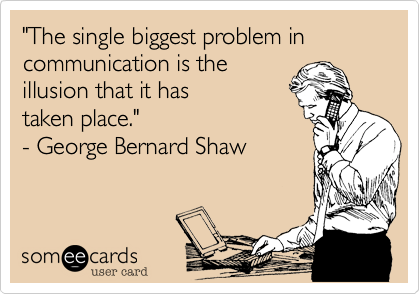
Trust is difficult to obtain in every relationship (professional or personal). A lot of companies consider trust as being a core value, however, to trust, you need much more than just this word on a paper.
You need to work on it, and one of the aspects you need to work on is the creation of an open and transparent communication atmosphere where people can be their own.
It doesn’t start with THEM, it starts with YOU. If you are open and transparent to others, speak out your mind in a constructive way, do not blame people for making mistakes, they will tend to do the same.
Note, however, that you can only establish this culture if you can yourself accept constructive criticism.
Take the example that you defend this value but that when your colleague Cho explains you what you did wrong you act very defensively, you will lose her trust, as you are not consistent. Furthermore, she, and other colleagues, will stop being honest with you and will start gossiping. And gossips are like a cancer in your company. They will act like nothing is wrong, but nothing could be less true.
Being indifferent to others will not help improving the trust issue
Often forgotten, however important, being empathetic increases the trust of people. Empathy is the ability to share someone else’s feelings. One of the best ways to do that, is trying to put on their shoes. This is, however, only possible if you ask enough questions to fully understand what they are going through (ask open-ended questions: https://www.wikihow.com/Ask-Open-Ended-Questions).
It helps you understand their choices and shows them that you care for them. It does not only improve the relationship and communication between you both, it also improves the mutual trust. Indeed, you will not be suspicious anymore about this person as you tried to understand her on his point of view.
To trust is not being naive
I don’t pretend that you should trust everyone. What I pretend, however, is that the relationships you have (professional or personal) should be based on people you trust.
In the case of your parents for example, of course, unconditional love is the reason of your trust, however, is this love really needed to trust? If you have the feeling that you cannot trust someone, even after being open and empathetic, then don’t lose time and remove this person from your circle of contacts. Focus on people that are worth it.

As a conclusion, I am not saying that I have the cure to mistrust, as this is a very complex issue that cannot be solved in one day. I’m just stating that being open, transparent and empathetic with your team would help to trust each other more. This trust could lead to a higher productivity. Meanwhile, remember that everything starts with you. Indeed, if you don’t trust others, how can you expect they trust you? So start by asking yourself this question: “what if I trusted more?”
Time is not money, time is much more valuable than money
“Take a minute to think about the most valuable things in life. If you are like most people, your list includes things such as family, friends, fitness and finances (money).
Now, how would you rank these things on your list? It might surprise you to discover that many of those who are considered highly successful all rank the same thing at number one: time.
Why do these people consider time to be such a valuable asset? Shouldn’t health be No. 1? Well, think about it: You can be healthy, and then get sick, and then regain your health.
How about money? You can lose all your money, and then you can make it all back.
Friends are important, and yet, how many friends did you have back in college that you no longer keep in touch with? Or even people who were guests at your wedding, and that was the last day you ever saw them? Yes, friends are prized, yet we lose them and make new ones all the time.
Your spouse might mean the world to you. And yet, 50% of married people get a divorce, and many divorced people find a new husband or wife that is suddenly the love of their life.
But time… You can never lose time and get it back again. You can’t spend time and go earn more of it. You can’t buy it, rent it, or borrow it. Use it wisely and enjoy the benefits. Squander it, and it’s gone forever.”
Kevin Kruse in 15 secrets successful people know about time management
Monday, 9 AM. First thing I do, I check my e-mails. I read all of them, answer to the ones I can answer quickly, leave the rest in my mailbox and I “unread” the most important ones.
Next thing, my to-do list: I try to find the things that can be quickly done. “Plan a meeting with Sam”. Nice, I send him a doodle and start the new task. What a nice feeling, I’ve removed 5 of the 19 to-dos! Meanwhile, I’m regularly checking my mails, I’m surfing on LinkedIn, checking messenger. Oh, time is flying! All the other to-dos are boring, I’ll do them tomorrow. “How was your weekend”? Oh, it’s Arwen, let’s chat. And… it’s 11 AM.
What’s wrong about this? Well, everything! Until a few weeks ago, I thought I was efficient as I could combine different professional tasks in a fast way. Oh how wrong I was. I still had so much to learn on time management (and still do as a matter of fact). Recently, by reading the book “15 secrets successful people know about time management by Kevin Kruse”, listening to various “Entreleadership” podcasts on Spotify and having some discussions with friends, I realised what is wrong with the picture I described above.
Let me tell you some efficient tips I learned these last few weeks:
Be a morning person

Even if there are theories saying that you should wake up late and start working late, I’m more convinced, in our society where school starts at 8 AM, that you should have a healthy morning routine as it will boost you and make you more efficient. Of course, the routine is different for every person, but this works for me:
- 6.30 – 6.40 : Waking up. Don’t snooze please, that’s not helping.
- 6.40 – 7.00: 15 minutes exercises. Exercises in the morning enhance your metabolism and improve your physical (of course!) but also your mental energy.
- 7.00 – 7.20 : Preparing breakfast and lunch. You can also prepare your lunch the day before if possible.
- 7.20 – 7.40 : Breakfast. Currently I’m losing a lot of time while eating my breakfast, because, pumped with energy, I start interesting discussions with my wife about all kinds of topics.
- 7.40 – 8.00: Prepare & leave. Finally, when my wife tells me I talk too much, I take my shower, get myself ready and leave for work.
Use your morning time wisely
Before anything else, when I arrive in the office, I take 15 minutes to plan my day:
- I try to avoid meetings in the morning.
- The activities where my full attention is needed are planned in the morning (R&D, working on mission statement & core values, budgets, etc.)
- The afternoon is for meetings, planning, mails, phone calls, etc.
Then I quickly check my inbox, without opening any mail, just to see if there is something urgent that would change my planning for the day (most of the time you can see it while reading the subject line). After that, it’s time to work!
Stop making a to-do list, start planning a to-do list
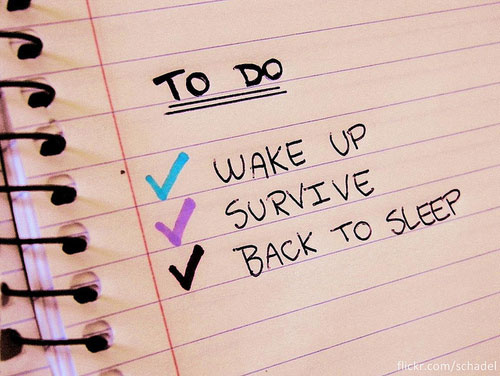
“I will add it to my to-do list”. Everyone has said or heard that often in his/her life. Do you know what the problem is with a to-do list? It is time independent. It means that you can have as many to-dos as you want in your list. What’s the result of that? You try to do some of them but never have time or motivation for all of them. In the meantime, you are stressed because you still have a never-ending list and you don’t know when you will be able to complete all these tasks.
Let’s change this!
- Start writing your to-dos as actions
- Plan them in your agenda as an actual event (I give my to-do events a specific purple colour, so I know it’s not a meeting but it’s a to-do). This provides me the opportunity to think about when can I work on this to-do, and how long it will take.
In conclusion, I do keep a to-do list when I’m not able to plan my to-dos, but every morning, I plan the to-dos in my agenda and then remove the items from my to-do list. No “damn I did not finish all my to-dos”, or “when will I able to do all that”.
Don’t be connected all the time
Checking your mails three times a day is enough. If it’s really that important, they will call, believe me. Do you have your phone constantly connected and are you getting notifications of mails, WhatsApp, messenger, etc.? Well remove automatic syncing, or keep your phone on silent mode and face down on your table.
I keep the sound for phone calls, but mute the rest. In that way, I can still hear the phone calls, but all the other things can wait until I want to check my phone during a break. And in the meantime, I’m not disturbed during my work and can really focus and work efficiently.
The mail routine
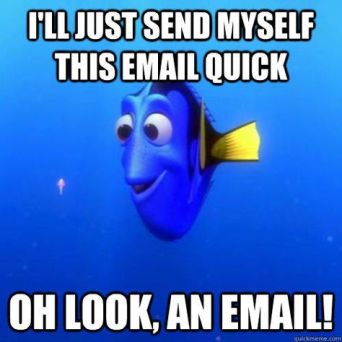
First, try to avoid sending mails. It costs you more time to type than to talk. And even if you sent the e-mail, you will waste much more time than if you had called. Conclusion: call if possible, you’ll love it.
When mail is the best option, I have a very specific mail routine that helps me keep track of this communication tool that has lost all its effectiveness.
- All team discussions are not done by mail but through Slack. I refuse to send (and receive) mails from my team members, except if they really need to put me in CC. Slack, if well organised, is a great tool to communicate. If we need to discuss a mail someone received, we transfer that mail to slack and discuss it there.
- If you read, you act. Once you open a mail, don’t “unread” it again, act immediately! You lose a lot of time when you read a mail, do nothing, and read it again a few hours later. Why did you read it for the first time? How did that help you?
- How do you act? You reply, or you plan it to in your agenda and you delete/archive/file it. If you need to do some work first before being able to answer it, then plan that task in your agenda, and move the mail to an agenda item so that you plan a reply.
- Empty your inbox! The feeling of an empty inbox is priceless. So, after replying or planning your mail, file it into a folder.
- Follow your sent items. How often do you send a mail, and forgot that you were waiting for a reply? And by the time you realise that, it’s already too late. What I do, in order not to fill my to do list with follow-up e-mails, I put my important sent mail in a folder (“TO FOLLOW”) where I’ve added a conditional formatting that highlights the mails in red if they are older than x days, for example 5 days (https://www.datanumen.com/blogs/auto-highlight-outlook-emails-based-ages/) . Every day, after lunch, I check this folder and send a reminder for all mails that are in red. Or I call.
Feel free when you go home
At the end of my day, I take 15 minutes to reflect on the day and do following last things.
- I empty my mailbox
- I plan my following day
- And I also try to plan the rest of the week, but by keeping buffers to be able to add things (meetings, tasks, etc.) when necessary.
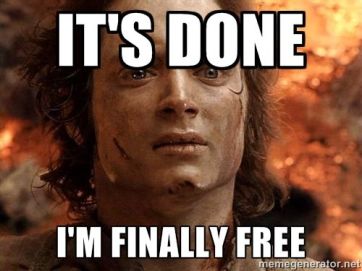
Planning a to do list in your calendar, neglecting your smartphone while working, avoiding sending mails and replying to mails in a structured way (without spending too much time on it) are just a few of the tips that could enhance your productivity. Don’t forget, however, that you should stay true to yourself and try to find a ritual where you feel comfortable. In the end, it’s all about avoiding losing time on unnecessary things so that you can focus on what matters the most: your business but also family and friends. And that’s so much more valuable than money.





